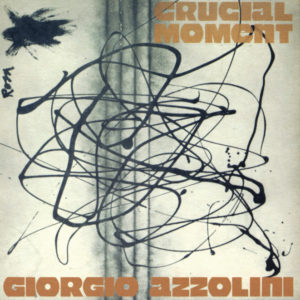Released: 2000
 RW 111 CD | EAN: 8018344021119 |
RW 111 CD | EAN: 8018344021119 |  RW 111 LP | EAN: 8018344121116 |
RW 111 LP | EAN: 8018344121116 |
«Crucial moment» the title assigned by Giorgio Azzolini. And as a fact, jazz in the past years has been going through a crucial, decisive period. On one side the conservation of traditional values of the language and its well-known inspiring of the cause; on the other side the intentions, sometimes only foolish aspirations, of subversion and reorganization, on quite different bases, of jazz expression. The transformed historical – environmental conditions in which the American jazzman operates (obligatory, in the matter, this precise geographic reference) have logically impressed a new motivation to his expressive demand, shown clearly in the « free » compositions that represent, at their highest and most authentic level, a precise indictment against the sociocultural « establishment » of the official America. The European jazz-men, who finds himself performing in a very different social context, must only gather the echoes of this attitude and transform them in a substantially different direction: The concept of liberty, for him, will not contain the lit fuse of racial dispute, but will be oriented in the dimensions of a refusal towards the expressive patterns encoded in the opposition of a generic conservative mentality. Sadly his « exploits » will often be judged, by an unprepared public, not differently than some formal exercises, abstract satisfactions, sometimes at the limits of pure eccentricity. In the more restricted panorama of Italian jazz the race towards the stylistic – expressive alignment finds greater difficulty than elsewhere for its few possibilities of action offered to our musicians and for the reduced circulation of ideas than that found in other European countries musically (and culturally) further evolved such as England, France, Germany and Sweden. But it would be wrong not to underline the fact that things are changing here too, decisively.
Giorgio Azzolini is one Italian musician among the most tested by experience, by a more solid musical preparation, by an undisputed seriousness of intentions. He has begun with caution but with a profound security on the road of new jazz, without the intention of stupefying, which is almost always interpreted as a purely snobbish act, but with the intention of profit through complete maturity, reached through a long and varied career, of his creative capacities. And this album, which follows brilliant results in the album « What’s happening? » by two years, is the brightest confirmation of his « inner nature » progress, therefor not influenced by the easy resounding of fashion.
To the formula of the trio, tested in the previous album, he remains faithful only in a minimum part. At his side there is still the pianist Franco D’Andrea, who has also reached a worthy level of maturity, which is certainly his most congenial « partner », and there is a percussionist, this time the Italo-French Aldo Romano who is maybe the most complete among the European avant-garde drummers. Plus there is a new addition of a fourth element, that of trumpet-player Enrico Rava entirely integrated into the « free » climate, having worked at the side of Steve Lacy with which he had also gone to America: his name is found, the only among Italian musicians, in the catalogue of the most authoritative avant-garde jazz labels, « Esp-Disk ». Four of the six themes in the program see the formation of the quartet: Crucial moment, Giorvi, Blues deflection and Beyond the corner. They are all Azzolini’s themes, from the dry penetrating design who’s development is entrusted to the resources of total improvisation which witnesses the creative affinities which bond the four musicians. In particular, the lyrical dimension of Giorvi, a davisian ballad dedicated by Azzolini to his daughter and wife (Giorgia and Vittoria), merits a citation. The trio, without Rava’s trumpet, in Israel perform the only borrowed composition: but the celebrated theme of Johnny Carisi, consecrated by the famous version of Miles Davis for « Capitol », is relived in an independent manner and is enriched by many stimulating suggestions. Lastly, Free Duet, protagonists and authors Azzolini and D’Andrea, confirms the refined and happy feeling between the two musician-friends, the sensitivity of the pianist and the mastery of the contrabass player in the difficult use of the bow, today very frequent, but rarely with results this persuasive.
Pino Candini
CREDITS
Giorgio Azzolini - bassFranco D'Andrea - piano
Enrico Rava - trumpet
Aldo Romano - drums

